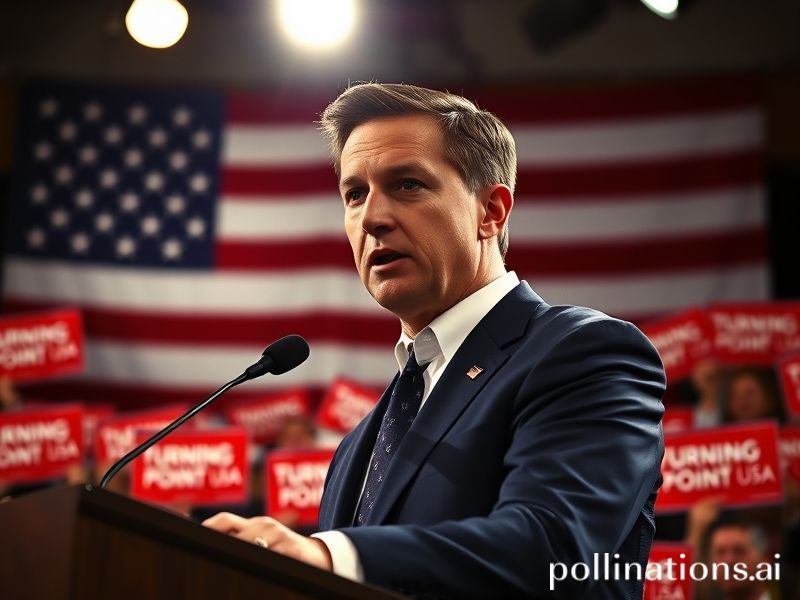Charlie Kirk, Inc.: How One American Bro Built a Global Grievance Empire
Charlie Kirk and the Great American Export: Turning Grievance into a Growth Industry
by Dave’s Locker Foreign Desk
If you’ve been anywhere near a Wi-Fi connection on five continents lately, you’ve probably seen the haircut: the same side-parted, Lego-polished coif that looks as if it was ordered in bulk from a factory in Guangzhou labeled “Generic Young Statesman, Assembly Required.” Meet Charlie Kirk, the 30-year-old entrepreneur of American umbrage, now franchising his particular flavor of red-meat conservatism from the suburbs of Phoenix to the lecture halls of London and the Zoom screens of São Paulo. The world once imported jazz, Hollywood, and the assembly line; today it’s getting a subscription box of culture-war buzzwords delivered with the urgency of last-mile logistics.
The pitch is deceptively simple: take one part campus outrage, two parts anti-woke monetization, drizzle with founding-father cosplay, and serve lukewarm to anyone who thinks taxes are theft and TikTok is the devil’s mirror. Abroad, the concoction lands differently. In Britain, where the national sport is queuing and the second is tut-tutting, Kirk’s touring debate club, Turning Point UK, has managed the impressive feat of making Nigel Farage look moderate. In Australia, where even crocodiles apologize before biting, TP Australia has rebranded the humble barbecue into a rhetorical cage match over carbon credits and gender pronouns. Meanwhile, in Brazil, local influencers translate Kirk’s one-liners into Portuguese and sell them like carnival confetti—proof that ideological glitter bombs travel faster than any customs form.
The global appeal isn’t the ideology per se; it’s the operating system. Kirk has perfected the art of the perpetual grievance loop: declare an existential threat (drag-queen story hour, ESG scores, oat milk), monetize the backlash through donor newsletters and podcast ads, then point to the outrage you just manufactured as evidence the threat is real. It’s Amway for people who think Amway is too woke. Foreign investors—ranging from European right-wing foundations to Latin American tech bros fleeing regulation—have noticed the ROI. After all, anger scales elegantly across languages; subtitles are cheaper than manufacturing actual policy.
Critics like to dismiss Kirk as a glorified campus troll with a LinkedIn Premium account. That’s missing the geopolitical subplot. The same week Germany was debating whether to ration heating oil, Kirk’s Twitter feed lit up with memes blaming “globalist elites” for the price of bratwurst. The European far-right dutifully clipped, subtitled, and rebroadcast the content within hours. Result: German Telegram channels now quote an American 30-year-old on topics he can’t pronounce. Soft power used to come with blue jeans and rock concerts; now it arrives as a 240-character hot take wrapped in the Stars and Stripes emoji.
There’s something grimly comic about watching nations with centuries of colonial baggage adopt an Iowa-born talking point about “sovereignty.” It’s as if the British Empire were taking etiquette lessons from a Cheesecake Factory manager. Yet the market keeps growing. In South Korea, Turning Point chapters hawk “anti-communist streetwear” that looks suspiciously like Supreme knockoffs. In Nigeria, Twitter influencers remix Kirk’s clips to defend anti-LGBTQ laws, citing “Western decadence” with no apparent irony. The grievance supply chain has gone fully globalized—outsourced, repackaged, and tariff-free.
Of course, every export carries a warning label. When the product is distilled outrage, the side effects include democratic heartburn and occasional insurrection. January 6 was the FDA recall nobody read. Still, the margins are irresistible: a single viral clip can fund a mid-sized think tank for a quarter. Like any good multinational, Kirk’s empire is hedging against reputational risk by diversifying into crypto, wellness supplements, and something called “freedom phones” that appear to run on recycled MAGA hats.
The arc of the moral universe may bend toward justice, but the arc of late capitalism bends toward whatever can be drop-shipped from Arizona with a two-day delivery guarantee. Charlie Kirk’s true innovation isn’t ideological; it’s logistical. He’s turned the American id into a plug-and-play franchise kit, ready for assembly in whatever country still has Wi-Fi and a lingering inferiority complex about the United States. The rest of us can laugh, cry, or open a competing brand—though good luck finding a fresher grievance. The warehouse is already empty, and the next shipment is stuck at the border behind a container of “Let’s Go Brandon” coffee mugs.







